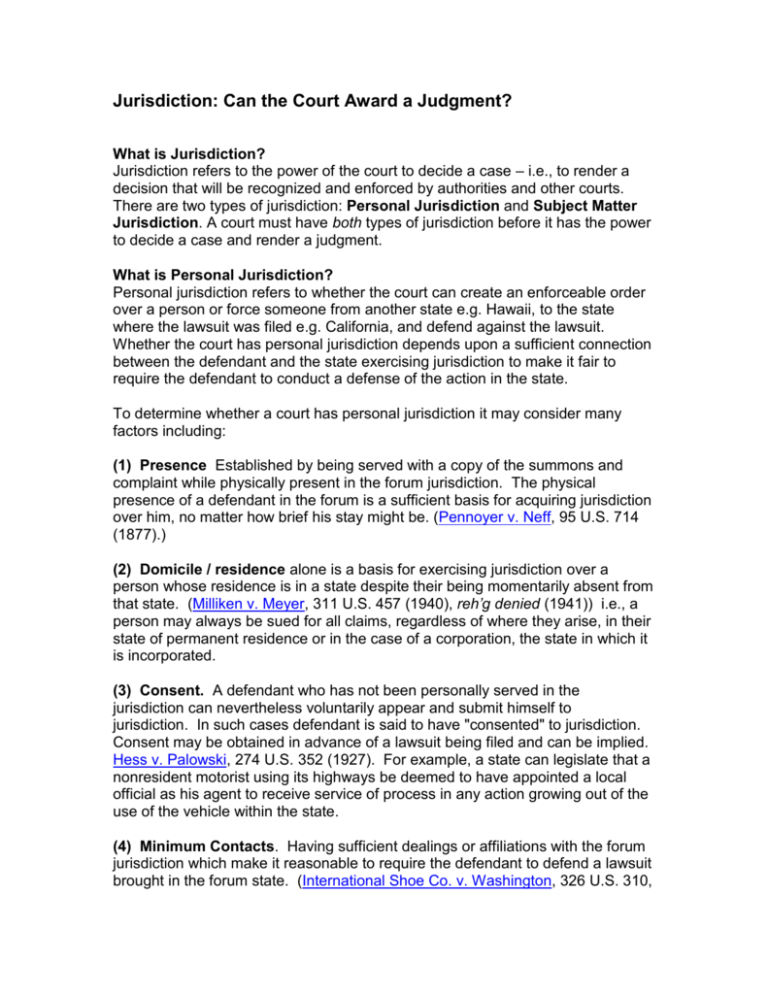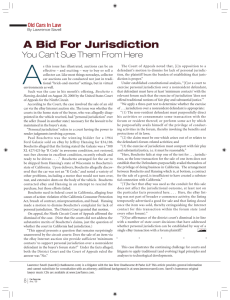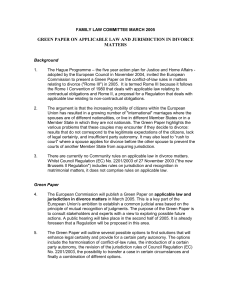Jurisdiction: Who Can Decide Your Case
advertisement

Jurisdiction: Can the Court Award a Judgment? What is Jurisdiction? Jurisdiction refers to the power of the court to decide a case – i.e., to render a decision that will be recognized and enforced by authorities and other courts. There are two types of jurisdiction: Personal Jurisdiction and Subject Matter Jurisdiction. A court must have both types of jurisdiction before it has the power to decide a case and render a judgment. What is Personal Jurisdiction? Personal jurisdiction refers to whether the court can create an enforceable order over a person or force someone from another state e.g. Hawaii, to the state where the lawsuit was filed e.g. California, and defend against the lawsuit. Whether the court has personal jurisdiction depends upon a sufficient connection between the defendant and the state exercising jurisdiction to make it fair to require the defendant to conduct a defense of the action in the state. To determine whether a court has personal jurisdiction it may consider many factors including: (1) Presence Established by being served with a copy of the summons and complaint while physically present in the forum jurisdiction. The physical presence of a defendant in the forum is a sufficient basis for acquiring jurisdiction over him, no matter how brief his stay might be. (Pennoyer v. Neff, 95 U.S. 714 (1877).) (2) Domicile / residence alone is a basis for exercising jurisdiction over a person whose residence is in a state despite their being momentarily absent from that state. (Milliken v. Meyer, 311 U.S. 457 (1940), reh’g denied (1941)) i.e., a person may always be sued for all claims, regardless of where they arise, in their state of permanent residence or in the case of a corporation, the state in which it is incorporated. (3) Consent. A defendant who has not been personally served in the jurisdiction can nevertheless voluntarily appear and submit himself to jurisdiction. In such cases defendant is said to have "consented" to jurisdiction. Consent may be obtained in advance of a lawsuit being filed and can be implied. Hess v. Palowski, 274 U.S. 352 (1927). For example, a state can legislate that a nonresident motorist using its highways be deemed to have appointed a local official as his agent to receive service of process in any action growing out of the use of the vehicle within the state. (4) Minimum Contacts. Having sufficient dealings or affiliations with the forum jurisdiction which make it reasonable to require the defendant to defend a lawsuit brought in the forum state. (International Shoe Co. v. Washington, 326 U.S. 310, 66 S.Ct. 154, 90 L.Ed. 95 (1945).) A defendant who has never been physically present in California may be subject to personal jurisdiction and be compelled to defend a lawsuit in California or face an adverse judgment. They must have sufficient minimum contacts with the forum state such that compelling him to appear and defend in the forum does not offend traditional notions of fair play and substantial justice. I.e., the due process clause does not permit a state to exercise personal jurisdiction over an individual or corporation with whom the state has no contacts, ties or relations. (5) Purposeful Direction. Established if a defendant committed an intentional action that was expressly aimed at the forum state with the knowledge that the majority of the injury would be felt in the forum state. Calder v. Jones, 465 U.S. 783 (1984). What is Subject Matter Jurisdiction? Subject matter jurisdiction is the authority of the court to decide a particular type of case. Subject matter jurisdiction is set by the federal or state Constitution, or by state statutes. Divorce: In order for a court to have subject-matter jurisdiction over a divorce action, at least one spouse must have lived in the county where the court is located for a certain period of time. To obtain a divorce in California, a person must have lived in California for at least six months, and in the particular county in which they want to obtain the divorce for at least three months. Bankruptcy: Bankruptcy cases are exclusively heard in federal court. If by some trick a party is able to get the papers passed the clerk and file a bankruptcy case in state court, the judge would not grant the bankruptcy. They would not have jurisdiction. Small Claims: The Small Claims Court is designed to hear disputes valued at $7,500.00 or less. - Individuals may file a claim in Small Claims court for up to $7500. - Corporations or other business entities may sue for up to $5,000. The parties represent themselves; they generally cannot have an attorney represent them. It is meant to go faster than a lawsuit in Superior Court, and some rules of evidence are relaxed. Many disputes are heard within two months of filing the claim, and the hearing itself often lasts only fifteen minutes. The judge may announce his/her decision right there or mail it within a few days. For information on the Small Claims process and step-by-step instructions on how to file a Small Claim, visit http://ocsmallclaims.com/StartSCCase.aspx. For more information or assistance you can contact: Legal Aid Society of Orange County 2101 N. Tustin Ave. Santa Ana, CA 92705 Phone (714) 571-5277 www. ocsmallclaims.com California Code of Civil Procedure: www.leginfo.ca.gov/calaw.html Revised 06/12




